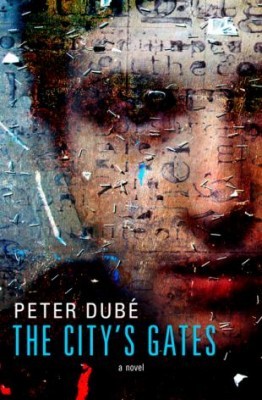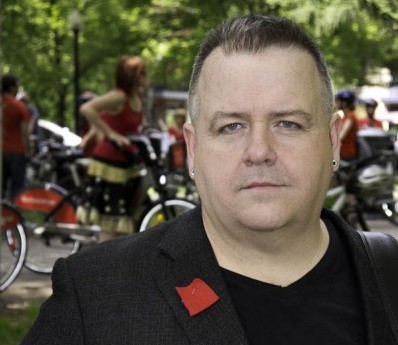A Sûreté du Québec helicopter has been dominating the downtown sky for a couple of months already. Grumbling insistently, it casts an interrogating eye on a city that no longer seems to sleep. Montreal nights are punctuated by shouting, sirens, and the occasional sound of explosives, for what started out as a Quebec student strike against tuition fee hikes has bloomed into a full-blown social movement, echoing the Occupy protests that erupted in the fall. The Quebec government’s attempt to regain control backfired when it passed the highly contentious Bill 78, attempting to curb protest rights. Deemed unconstitutional by many, the emergency law only added fuel to the protesters’ bonfire, drawing more support to the student cause.
As the helicopter looms over my apartment, I am awestruck by synchronicity. The City’s Gates opens with Montreal preparing to host an International Economic Conference, an event that deepens the ideological divide between those who embrace corporate culture – and those who question it. While some are eagerly preparing to welcome the policy-makers and moneylenders, activists groups such as carp (the Coalition Against Rapacious Profiteering) are ardently organizing protests. Kyle, a carp member whose discourse sounds oddly familiar, laments:
They [the corporations] want a world in which nothing is more important than profit […] a world in which—above all— nothing is free, nothing a fundamental human right—belonging to us inalienably just because we’re human beings. Not our health and well-being, the sanctity of our families, not green spaces to rest in, not streets to walk down without the clutter and noise of mercantile hawking. Not clean water to drink, not even our imaginations.
“The fact that The City’s Gates’ publication ended up coinciding with the events of Maple Spring fascinates me,” writes Dubé in an email. Hesitant to call his novel prophetic, he says it’s “more a case of the imagination tapping into something that was out there in the air.” Writing me from Vancouver, where he was on tour with his book, the former Quebec Writers’ Federation president explains: “I’ve been working on this novel for some time and its inspiration lies in other moments of passionate protest against globalization, like Seattle and Genoa or the G20 meeting in Toronto, for example … So, as I worked on my book I was reflecting on what had happened at past demonstrations, but also looking forward to what shape they might take in the future … because I was sure the movement would reappear. After all, it wasn’t like the problems had vanished.”
Asked about the current student strike and Bill 78, Dubé responds passionately: “Since any serious artist is interested in the possibilities of human life, and what such a life might mean in a deeper sense, I think we’re all partisans of freedom. And, if freedom means anything at all, it means the right to speak publicly and without censorship, to organize in pursuit of our shared interests, and to call the governments that claim to represent us to account. And I think that’s what is happening right now.”
Dubé’s protagonist, Lee, does not share his enthusiasm. A loner graduate of psychology, philosophy, and statistics, Lee is, in fact, remarkably apathetic, noting:
Everyone, regardless of which side of the proverbial fence they stand on, was rapt before this crisis in organizing the world and the world’s money. For the life of me I couldn’t muster a fraction of the passion that pulsed through everyone else. It was the end of the fucking world, but it was a world I couldn’t bring myself to care about.
Yet it is Lee’s very indifference that makes him the perfect candidate for the research assignment that drives Gates’ narrative. He is hired by the director of an unnamed university department to investigate the source of strange happenings that occurred during meetings leading up to the economic conference. Attendees have been behaving uncharacteristically, exhibiting a “disinclination to weigh their words before speaking.” Suspicious of the “possibility of a new drug’s emergence, one with possible links to political or counter-cultural tendencies in the occupy movement,” the authorities are anxious to restore order.
Lee befriends Roomie, an elusive outsider with the inside scoop, and, following his tips, sets out to study a broad range of counterculture groups, focusing mainly on two: the Mals, a gorgeous group of dropouts who fetishize style, favouring imagination and creativity over truth or reality; and carp, a left-wing collective determined to expose the ugly truths behind corporate capitalism and fight economic disparity.

The City’s Gates
Peter Dubé
Cormorant Books
$22.00
paper
327pp
9781770860940
The end result is a philosophical, metafictional work whose form is as quirky as its characters. Perception and language are key themes in this somewhat noir novel that contains elements of detective and speculative fiction and, as the author points out, slight touches of the picaresque. “As I wrote this book and explored the ways in which it simultaneously dealt with passion and struggle, the strain between language and silence, desire and rage, I saw that above and beyond merely handling such content, the shape of the book needed to reflect these tensions,” says Dubé.
At the centre of these tensions is Lee. Emotionally remote, his character serves as a window between worlds, providing the best view in town of Montreal’s fictional mysteries while reflecting society’s cynicism or hopelessness. “Although it is a fictional device in the novel, the kind of observational distance that characterizes Lee,” says Dubé, also “increasingly characterize[s] our culture (political passivity, declining voter turnout, a focus on comfort, a hunger for mindless distraction, etc.).”
Yet, in fiction as in fact, there is something about tear gas that tends to get emotions flowing. When Lee runs into a distraught carp acquaintance at a heated protest, the lens through which he views his friend switches to soft focus, and a new eye – his heart – opens like a velvet portal. “I don’t know why, but for that moment I wanted to keep holding him, even to kiss him,” he says in a touching moment of intimacy.
The plot thickens as Lee’s impassivity erodes, challenging his loyalty to his employer.
And, gradually, one gets the sense that something has been conceived – that although it may very well be the end of one world, another world –
a new vision – is asking to be born.
Heightening this impression are the closing lines of Dubé’s email. Linking his novel to real life, the author speculates that “the crisis [Lee] undergoes, his journey, and possible transformation, may have something interesting to say about where our culture is, and where it might – just might – be heading. Who knows?”
As I review Dubé’s email, the helicopter growls a little louder, and I flash back to the day I finished reading The City’s Gates: On May 22, 2012, tens (some say hundreds) of thousands of citizens, young and old, took to Montreal’s streets to oppose Bill 78. Some are calling it the greatest act of civil disobedience in Canadian history.
Indeed, who knows? mRb







0 Comments